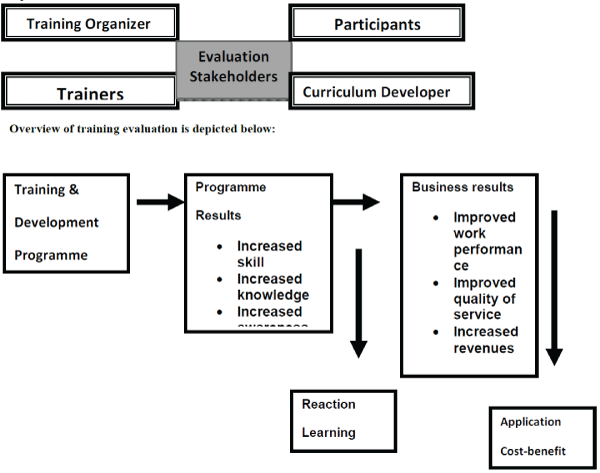ISSN ONLINE(2319-8753)PRINT(2347-6710)
ISSN ONLINE(2319-8753)PRINT(2347-6710)
|
Bharthvajan R Assistant Professor, Bharath School of Business, Bharath University, Chennai – 600073, India |
| Related article at Pubmed, Scholar Google |
Visit for more related articles at International Journal of Innovative Research in Science, Engineering and Technology
One of the most nebulous and unsatisfactory aspects of training programmes is the evaluation of their effectiveness. Evaluation is any attempt to obtain information (feedback) on the effects of a training programme, and to assess the value of the training in the light of that information. Training Evaluation is the application of systematic methods to periodically and objectively assess the effectiveness of training and development programmes in achieving expected results, their impacts, both intended and unintended, continued relevant and alternative or more cost-effective ways of achieving expected results.
INTRODUCTION |
| Evaluation leads to control which means deciding whether or not the training was worth the effort and what improvements are required to make it even more effective. Training Evaluation is of vital importance because monitoring the training function and its activities is necessary in order to establish its social and financial benefits and costs. Evaluation of training within work settings can assist a trainer/organization in learning more about the impact of training. It is important to understand the purpose of evaluation before planning it and choosing methods to do it. Some advantages of using evaluations are difficult to directly witness, but when done correctly they can impact organizations in positive ways. |
| Training Evaluation is the process of deep examination and analysis of: |
| • Selecting measures, |
| • Gathering information based on those measures, |
| • Comparing what participants learn to some standard, goal, or expectation. |
| Evaluation is a process to determine the relevance, effectiveness, and impact of activities in light of their objectives. In evaluating a training and development programme, one needs to consider that most training and development activities exist in a larger context of projects, programmes, and plans. |
Definition: |
| "Training Evaluation is a systematic process of collecting information for and about training activity which can then be used for guiding decision making and for assessing the relevance and effectiveness of various training components." |
TYPES OF EVALUATION |
| On the basis of the time dimension, evaluation may be classified as (1) formative evaluation and (2) summative evaluation. |
| Raab et al. (1987), however, classified evaluation into four major types: (1) evaluation of planning, (2) process evaluation, (3) terminal evaluation, and (4) impact evaluation. |
| Stakeholders of training evaluation involve participants, curriculum developers, trainers and training organizer as depicted below: |
 |
Objectives of Evaluating Training and Development Programmes |
| The major objectives are: |
| • To validate training and development as a business tool |
| • To justify the costs incurred in training and development |
| • To help improve the design of training and development programme |
| • To help in selecting training and development methods |
Purposes of Evaluating Training and Development Programmes |
1. At Macro Level |
| • To assess training and development programme's business impact as a whole. |
| • To facilitate selection of training and development programme’s performance metrics related to organization's goals and objectives. |
| • To get at the business impact measure through direct correlation to organization’s goals and objectives. |
2. At Micro Level |
| • To measure a specific training and development programme's business impact |
| • Perhaps looking at the benefit of specific elements of the programme, or of the training model for a specific issuer |
| • The specific training and development programme's business impact measure has a visible link to the organization's goals and objectives. |
| • To combine a number of these to project overall programme business impact. |
Trainers: |
| Careful consideration should be given to the selection of trainers, the scheduling of training and pilot testing. In selecting trainers, two equally important abilities must be sought: knowledge of the subject and teaching ability. Not everyone who has the required job knowledge will necessarily have teaching ability. On the whole, it is easier for people to acquire knowledge than it is to acquire teaching ability. In most workplaces, including the shop floor, there will be a number of people who have a natural teaching ability, and they will have the advantage of knowing the workplace and being able to understand practical examples. In small group learning, a "group learning facilitator" may be used in place of a trainer. In this case, the facilitator is learning along with the group but has responsibilities for the process of learning. |
| The scheduling of training involves several important considerations. For example, it should be arranged at a time convenient for the learners and when interruptions can be minimized. Training can also be packaged in self-contained modules so that it can be spread out over time perhaps a three-hour module once a week could be scheduled. Not only does this approach sometimes cause less interference with production, it also allows time between sessions for learners to try to apply what has been learned. |
CONCLUSION |
| Every training programme should be pilot tested before initial use. This allows the programme to be tested against training objectives. Pilot testing should involve not only the trainers but a representative sample of the prospective learners as well. |
References |
|